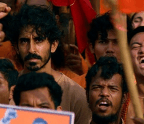Upstream Battle


When you get high enough into the mountains of Idaho, the fish are in the trees. For the past million years or so, sockeye and Chinook salmon have migrated 840 miles upstream from the Pacific Ocean, climbing 6,400 ft. into the Rockies and burning calories in their ruddy flesh from the ocean plankton they have eaten, depositing their eggs in the cool, rocky streams and, when they die, leaving behind nutrients to be absorbed into the Lodgepole pines and Western red cedars. The ancestors of the Nez Perce, the Shoshone-Bannock, the Coeur d’Alene and other Native American tribes built robust societies within that ecosystem. When Meriwether Lewis and William Clark were lost and starving in these mountains in 1805, Nez Perce found them and fed them salmon.
The current headquarters of the Nez Perce tribe is across the road from Lapwai Creek, a narrow, pebbly rivulet near the head of a major river system where wild salmon have always laid their eggs. Sitting in the air-conditioned prefab offices of the tribe, Shannon Wheeler, a Nez Perce leader, recalls hearing stories growing up about when the wild salmon swam up these waters in pods so dense, the creeks looked black. The salmon runs he watched as a kid were shadows of what his mother saw, but even so, Wheeler remembers fishing with his extended family on the south fork of the Salmon River each summer in the early ’70s, hooking wild Chinook for weeks. It’s where he learned to cover the thick, muscular fish in wet fir boughs to keep them cool and to leave a couple of fish down a trail to distract the bears that would come, and where he first heard the prayers and traditional songs that the elders sing when the salmon arrive.
That was before. Today, the
You’re reading a preview, subscribe to read more.
Start your free 30 days





